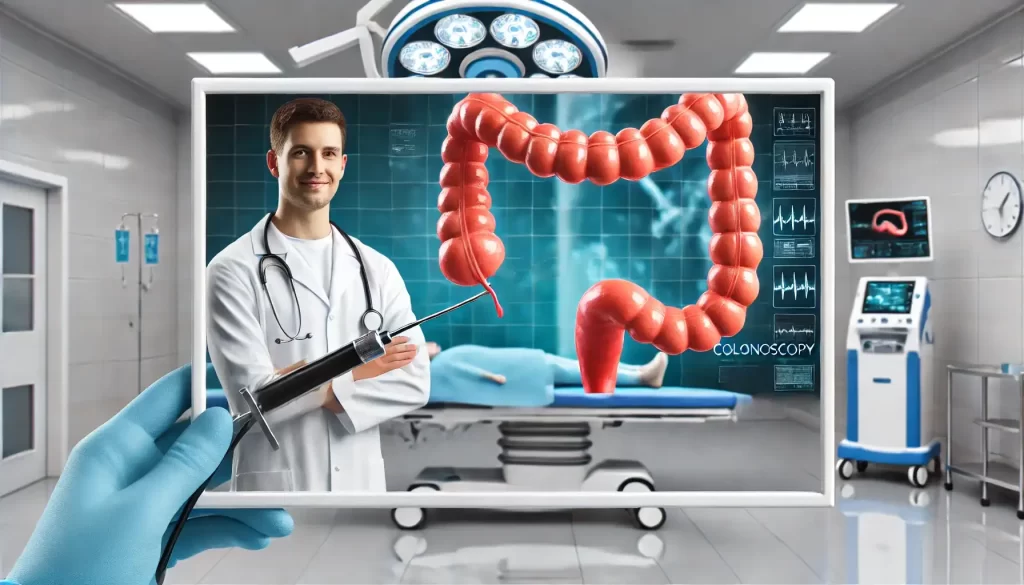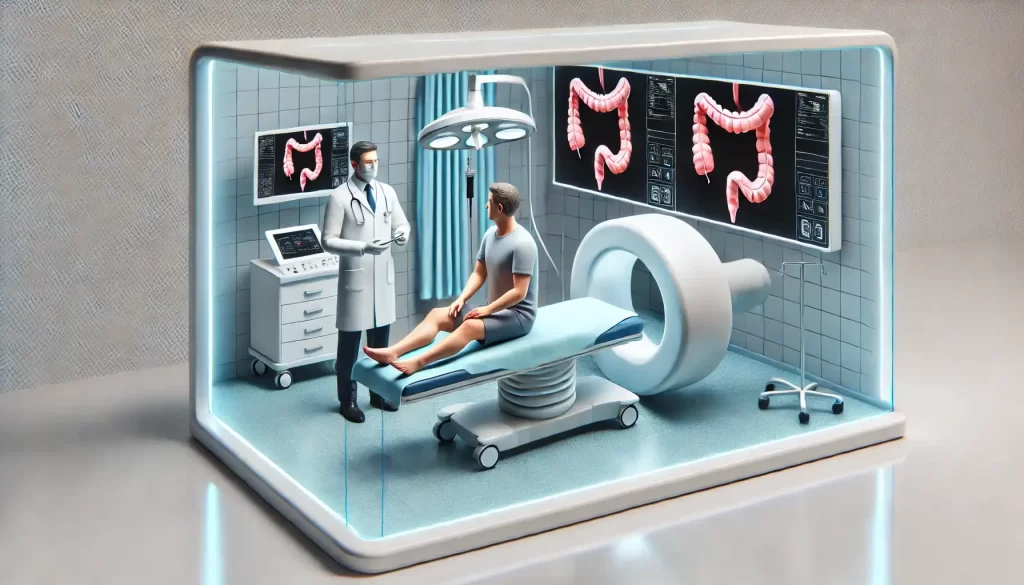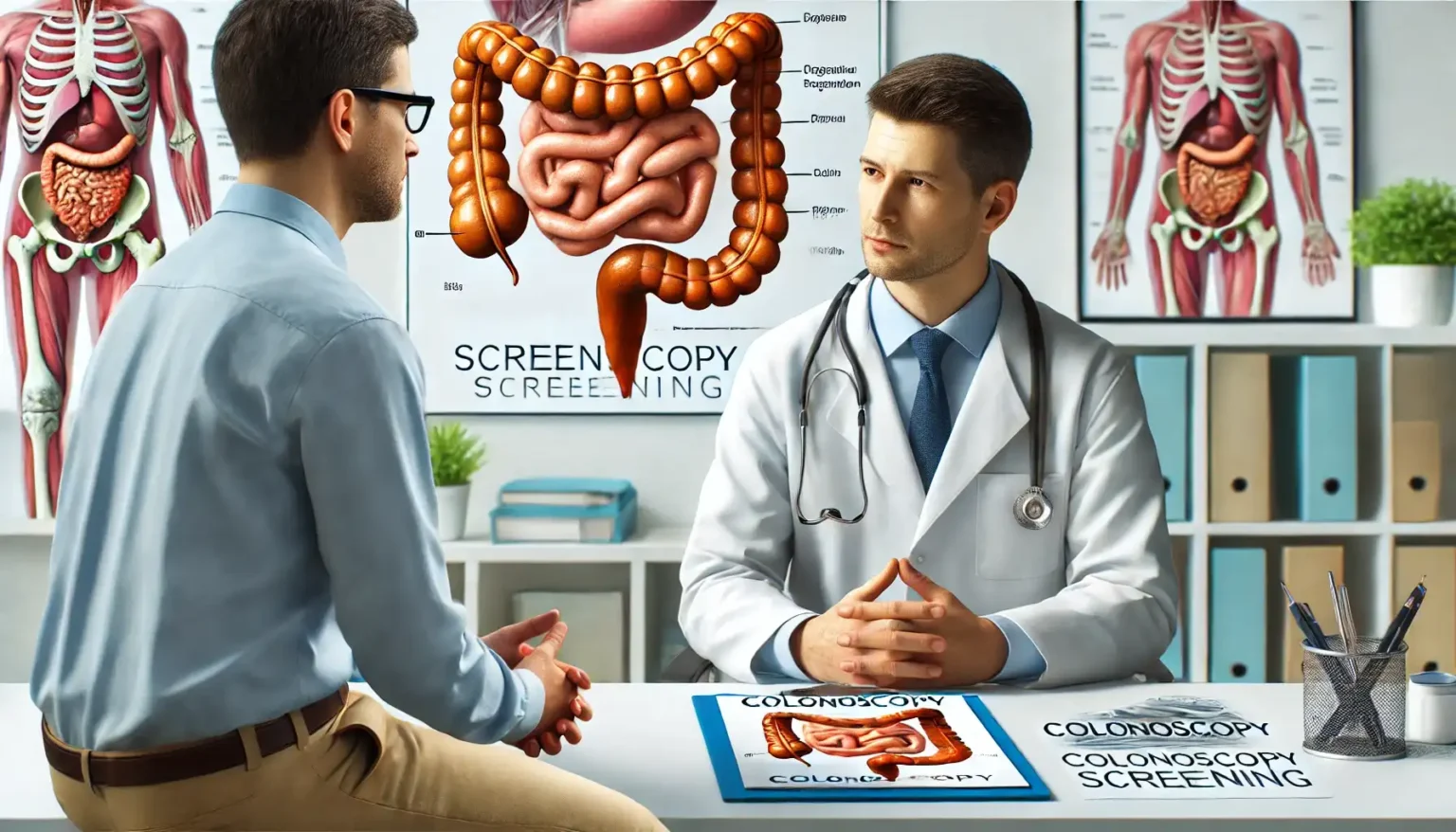Colonoscopy and colon cancer detection go hand in hand, forming a crucial part of preventive healthcare. Colon cancer is one of the most prevalent forms of cancer, but it is also one of the most preventable. With the help of a colonoscopy, early signs of the disease—such as polyps or other abnormalities—can be identified and treated before they progress into something more serious.
Despite its importance, many people hesitate to undergo a colonoscopy due to misconceptions or fear of the procedure. Understanding how this screening works and its role in colon cancer detection can provide clarity and peace of mind.
This guide will cover:
- How colonoscopy serves as the gold standard for colon cancer detection.
- Why early screening saves lives and who should prioritize it.
- Practical tips for preparing for and navigating the colonoscopy process.
Taking proactive steps today can safeguard your health tomorrow. Let’s explore why colonoscopy is a lifesaving tool for colon cancer detection.prevention. Let’s dive in!

What Is a Colonoscopy?
A colonoscopy is a medical procedure designed to examine the inner lining of the large intestine (colon and rectum). It is widely regarded as the gold standard for detecting and preventing colon cancer. By visualizing the colon, a colonoscopy allows healthcare providers to identify abnormalities such as polyps, ulcers, or tumors, often before they cause symptoms.
How a Colonoscopy Works
During a colonoscopy:
- A thin, flexible tube called a colonoscope is gently inserted into the rectum.
- The colonoscope is equipped with a tiny camera that transmits real-time video images to a monitor.
- This allows the doctor to carefully examine the entire length of the colon for any signs of abnormalities.
The procedure not only detects issues but also enables immediate treatment. For instance, polyps—small growths that may develop into cancer—can be removed on the spot during the colonoscopy.
Types of Colonoscopies
There are two main types of colonoscopies, each serving a different purpose:
- Screening Colonoscopy:
- Performed on individuals with no symptoms, typically as a routine check for early signs of colon cancer.
- Recommended for adults starting at age 45 or earlier for those at higher risk.
- Diagnostic Colonoscopy:
- Performed when a person exhibits symptoms such as rectal bleeding, unexplained weight loss, or changes in bowel habits.
- Used to investigate specific concerns or confirm a diagnosis.
Key Takeaway
A colonoscopy is more than just a diagnostic tool—it’s a preventive measure that can save lives by detecting colon cancer at an early, treatable stage. By understanding its purpose and benefits, you can feel more confident about prioritizing this vital health screening.
Let me know if you’d like additional enhancements! 😊
Why Is Colonoscopy Important for Colon Cancer Detection?
A colonoscopy is a powerful tool in the fight against colon cancer, offering both prevention and early detection. By allowing doctors to identify and address abnormalities such as polyps before they progress, colonoscopy plays a critical role in reducing the risk of developing advanced colon cancer.
Detecting Polyps Before They Become Cancerous
Polyps are small, abnormal growths that form on the inner lining of the colon. While most polyps are benign, some can develop into cancer over time. During a colonoscopy:
- Polyps can be identified and removed in the same procedure.
- This preventative step significantly reduces the likelihood of cancer developing in the future.
Key Fact: Approximately 95% of colon cancers develop from polyps, making early removal a vital preventive measure.
Diagnosing Colon Cancer Early
When colon cancer is detected early through colonoscopy, it is often at a stage where it is more treatable and confined to the colon. Early detection can:
- Increase treatment options, such as minimally invasive surgery or localized therapies.
- Improve outcomes by catching cancer before it spreads to other organs.
Pro Tip: Regular screenings ensure that abnormalities are addressed promptly, often before symptoms even appear.
Statistics on Survival Rates With Early Detection
The importance of early detection is underscored by survival statistics:
- When colon cancer is caught at a localized stage (Stage I), the 5-year survival rate is approximately 91%.
- In contrast, the survival rate drops significantly for advanced-stage cancers that have spread to other parts of the body.
Routine colonoscopies not only save lives but also improve the quality of life by reducing the need for more aggressive treatments later on.
Key Takeaway
Colonoscopy is essential for colon cancer detection because it identifies polyps early and enables timely intervention. By undergoing regular screenings, you can drastically reduce your risk of colon cancer and increase your chances of successful treatment if cancer is detected. It’s a proactive step toward long-term health and well-being.
Who Should Get a Colonoscopy?
Colonoscopy is a crucial procedure for detecting and preventing colon cancer, but not everyone needs one at the same time or frequency. Knowing when to start and how often to schedule a colonoscopy depends on individual risk factors, age, and medical history.
Guidelines for Routine Screenings
For most people, colonoscopy screenings begin at a certain age to catch early signs of colon cancer before symptoms develop:
- General Recommendation:
Adults at average risk should begin routine screenings at age 45, as recommended by the American Cancer Society. - Frequency:
If no abnormalities are found, a colonoscopy should be repeated every 10 years.
This guideline ensures early detection and timely intervention for the majority of people.
High-Risk Groups
Some individuals have an elevated risk of developing colon cancer and may need to start screenings earlier or undergo them more frequently. High-risk groups include:
- Family History:
- Those with a close relative (parent, sibling, or child) who has been diagnosed with colon cancer or advanced polyps.
- Begin screening 10 years before the age at which the family member was diagnosed or at age 40, whichever comes first.
- Genetic Predispositions:
- People with genetic conditions like Lynch syndrome or familial adenomatous polyposis (FAP) are at significantly higher risk.
- Screenings may start as early as the teenage years for FAP or early 20s for Lynch syndrome, with annual follow-ups.
- Inflammatory Bowel Disease (IBD):
- Conditions such as Crohn’s disease or ulcerative colitis increase the likelihood of colon cancer.
- Screenings typically begin 8–10 years after the onset of IBD symptoms, with a colonoscopy every 1–3 years depending on severity.
When to Start Screening and How Often
Screening schedules depend on individual circumstances:
- Average Risk:
Start at age 45 and repeat every 10 years. - High Risk:
Start earlier (age 20–40, depending on risk factors) and repeat every 1–5 years, as advised by your doctor. - If Abnormalities Are Found:
A follow-up colonoscopy may be recommended in 1–3 years, depending on the size, number, and type of polyps detected.
Pro Tip: Always follow your healthcare provider’s advice to ensure screenings are personalized to your risk level.
Key Takeaway
Colonoscopy is a lifesaving tool, but when and how often you should get screened depends on your age, family history, and overall risk factors. By following these guidelines and consulting with your doctor, you can stay proactive in maintaining your colon health and preventing colon cancer.
Preparing for a Colonoscopy
Proper preparation is essential for a successful colonoscopy. By following the recommended steps, you’ll ensure that your doctor can clearly examine your colon, leading to accurate results. While the process may seem intimidating, understanding what to expect can make it much easier.
Steps to Prepare for a Colonoscopy
- Dietary Restrictions:
- A Few Days Before the Procedure: Transition to a low-fiber diet, avoiding foods like whole grains, nuts, seeds, and raw vegetables.
- The Day Before the Procedure: Stick to a clear liquid diet, including water, broth, tea, apple juice, and clear sports drinks. Avoid any liquids that are red, purple, or orange, as they can interfere with the examination.
- Bowel Preparation:
- Your doctor will prescribe a bowel prep solution to clear your intestines. This involves drinking a laxative solution the day before the procedure to empty your colon completely.
- Follow the instructions carefully, as incomplete prep can lead to rescheduling the colonoscopy.
Pro Tip: Drinking the prep solution slowly and chilling it can make it more tolerable.
Common Concerns About Colonoscopy Preparation
- Discomfort:
- Many people worry about the bowel prep process. While it may be inconvenient, modern solutions are more tolerable than older formulations. Staying near a restroom is essential.
- Time Commitment:
- The preparation begins a day or two before the procedure, requiring adjustments to your schedule.
- The colonoscopy itself is usually completed within 30–60 minutes, but recovery from sedation may take a few hours.
- Safety:
- Colonoscopy is a safe procedure, with minimal risks. Rare complications include bleeding or perforation, but these are extremely uncommon when performed by a qualified professional.
Tips for a Successful and Stress-Free Experience
- Plan Ahead:
Arrange for someone to drive you home after the procedure, as you’ll be sedated and unable to drive yourself. - Stay Hydrated:
Drink plenty of clear liquids to stay hydrated during the bowel prep process. This will also help you feel more comfortable. - Create a Comfortable Environment:
Prepare your home with items like reading material, comfortable seating, and entertainment to pass the time during prep. - Communicate With Your Doctor:
Let your doctor know about any medications you’re taking, as some may need to be paused or adjusted before the procedure.
Pro Tip: If you’re feeling anxious, talk to your healthcare provider—they can explain the procedure in detail and address any concerns you have.
Key Takeaway
Preparation is a vital part of ensuring a successful colonoscopy. While it may require some planning and adjustment, following the recommended steps can make the process smoother and stress-free. Remember, a well-prepared colonoscopy can save your life by detecting and preventing colon cancer early.

What Happens During a Colonoscopy?
A colonoscopy is a straightforward procedure designed to examine the inner lining of your colon for abnormalities like polyps or signs of colon cancer. Understanding what happens during the process can help ease anxieties and ensure you feel prepared.
Step-by-Step Explanation of the Procedure
- Before the Procedure:
- You will change into a hospital gown and lie on your side on an examination table.
- A nurse or technician will check your vital signs and administer a sedative, usually intravenously, to keep you relaxed and comfortable.
- During the Procedure:
- The doctor gently inserts a colonoscope (a thin, flexible tube with a camera) into the rectum.
- The camera transmits live video images to a monitor, allowing the doctor to examine the entire colon.
- If polyps or abnormal tissue are found, they can often be removed or biopsied immediately.
- After the Procedure:
- Once the examination is complete, the colonoscope is carefully removed.
- The entire process typically takes 30–60 minutes.
What Patients Can Expect
- Sedation:
- Most patients are sedated and remain comfortable throughout the procedure.
- While you may feel slight pressure or bloating, significant pain is uncommon.
- Duration:
- The procedure itself lasts less than an hour, but you may need an additional hour for recovery from sedation before leaving the clinic.
- Recovery:
- Patients are advised not to drive or operate heavy machinery for the rest of the day due to lingering sedation effects.
- Minor bloating or cramping may occur but usually resolves quickly.
Addressing Common Fears and Misconceptions
- Fear of Pain:
- Sedation ensures the procedure is virtually painless. Most patients don’t even remember the process.
- Embarrassment:
- Medical professionals perform colonoscopies regularly and prioritize your dignity and comfort throughout the procedure.
- Risks:
- Complications like bleeding or perforation are rare, especially when the procedure is done by an experienced professional.
Key Takeaway
A colonoscopy is a safe, efficient procedure that provides invaluable insight into your colon health. With sedation to ensure comfort and immediate recovery afterward, it’s a vital step in the early detection and prevention of colon cancer. Being informed about what to expect can make the process feel manageable and stress-free.
Benefits and Limitations of Colonoscopy
Colonoscopy is widely regarded as the gold standard for colon cancer detection and prevention. While it offers many benefits, it’s essential to understand its limitations and how it compares to other screening methods.
Advantages of Colonoscopy
- Accurate Detection:
- Colonoscopy provides a clear, direct view of the colon, enabling doctors to detect even small abnormalities such as polyps or early-stage tumors.
- Prevention Through Polyp Removal:
- One of the unique benefits of colonoscopy is its ability to not only detect but also remove polyps during the procedure. This prevents them from developing into cancer over time.
- Peace of Mind:
- With a thorough and precise examination, colonoscopy offers reassurance by ruling out or addressing potential issues early.
Key Fact: Studies show that regular colonoscopies reduce the risk of colon cancer by up to 68% in high-risk individuals.
Limitations of Colonoscopy
- Preparation Requirements:
- The bowel preparation process can be uncomfortable and time-consuming. Patients must adhere to strict dietary restrictions and drink a prescribed laxative solution to clear the colon.
- Potential Risks:
- Although rare, complications such as bleeding, infection, or perforation of the colon can occur. These risks are minimized when the procedure is performed by an experienced professional.
- Cost and Accessibility:
- Colonoscopies can be expensive, and access to qualified specialists may be limited in some regions. Insurance coverage often varies.
Comparison to Other Screening Methods
While colonoscopy is the most comprehensive screening method, there are alternatives to consider:
- Stool Tests (e.g., FIT or Cologuard):
- These non-invasive tests detect blood or abnormal DNA in stool samples, which can indicate potential cancer.
- Advantages: No preparation needed, done at home.
- Limitations: Less accurate, cannot remove polyps or confirm abnormalities.
- CT Colonography (Virtual Colonoscopy):
- Uses imaging to create a detailed view of the colon.
- Advantages: Non-invasive, no sedation required.
- Limitations: Polyps cannot be removed, and radiation exposure is a concern.
- Sigmoidoscopy:
- Examines only the lower part of the colon.
- Advantages: Shorter procedure time and less preparation required.
- Limitations: Misses abnormalities in the upper colon.
Key Takeaway
While colonoscopy is the most effective method for detecting and preventing colon cancer, it may not be suitable for everyone. By weighing the benefits and limitations, and considering alternative methods, you and your healthcare provider can choose the best screening strategy for your needs. Prioritizing routine screenings is a vital step in safeguarding your health.
Myths and Facts About Colonoscopies
Colonoscopy is a life-saving procedure, yet it is often surrounded by misconceptions that deter people from undergoing this vital screening. Let’s debunk some common myths and provide accurate information to encourage informed decisions about your health.
Myth 1: Colonoscopies Are Painful
Fact: Colonoscopies are virtually painless for most people.
- During the procedure, patients are sedated, ensuring they feel no discomfort.
- Some may experience mild bloating or cramping afterward, but this usually resolves quickly.
Myth 2: I Don’t Need a Colonoscopy If I Have No Symptoms
Fact: Colon cancer often develops without noticeable symptoms in its early stages.
- A colonoscopy detects polyps or cancer before symptoms arise, making it a crucial tool for early intervention.
- Routine screenings are recommended starting at age 45, even for those without symptoms or a family history.
Myth 3: Colonoscopy Is Unsafe
Fact: Colonoscopies are safe when performed by qualified professionals.
- While rare complications such as bleeding or perforation can occur, these risks are minimal compared to the benefits of early detection.
- Advances in technology and expertise have made the procedure safer than ever.
Myth 4: I’ll Need a Colonoscopy Every Year
Fact: For most people, colonoscopies are only required every 10 years if no abnormalities are found.
- Those with higher risk factors may need more frequent screenings, as recommended by their healthcare provider.
Myth 5: Preparation Is Too Difficult
Fact: While preparation can be inconvenient, it is manageable with proper guidance.
- Modern bowel prep solutions are more tolerable than older versions.
- Following a low-fiber diet a few days before the procedure can make the process smoother.
Myth 6: It’s Embarrassing to Get a Colonoscopy
Fact: Medical professionals prioritize your comfort and dignity.
- Colonoscopies are routine procedures performed by experienced specialists who are focused on your health.
- The process is confidential, and you’re cared for in a professional setting.
The Importance of Regular Screenings
- Colonoscopy is the most effective tool for detecting and preventing colon cancer.
- Debunking these myths can help reduce anxiety and encourage more people to prioritize their health through regular screenings.
Pro Tip: Talk to your doctor about any concerns or misconceptions you may have. Open communication ensures you feel confident and informed about your decision.
Key Takeaway
Colonoscopy myths often prevent individuals from taking this crucial step toward preventing colon cancer. Understanding the facts can help you overcome fears and prioritize your health. Regular screenings can save lives—don’t let misconceptions hold you back.
FAQs About Colonoscopy and Colon Cancer Detection
Colonoscopy is a vital procedure, but many people have questions about what to expect. Here are answers to some of the most commonly asked questions.
Does a Colonoscopy Hurt?
No, colonoscopies are not painful.
- During the procedure, patients are sedated or under anesthesia, ensuring they remain comfortable.
- After the procedure, some may experience mild bloating or cramping, but these effects are temporary and manageable.
How Long Does It Take to Recover From a Colonoscopy?
Recovery from a colonoscopy is quick for most people.
- Patients typically need 1–2 hours to wake up fully from sedation at the clinic.
- Mild drowsiness may persist, so avoid driving or operating machinery for the rest of the day.
- Most people feel back to normal by the next day.
What Happens If a Polyp Is Found During the Procedure?
If a polyp is found, the doctor will usually remove it immediately.
- The removed polyp is sent to a lab for analysis to determine if it is benign, precancerous, or cancerous.
- This proactive approach prevents potential cancer development and ensures any concerns are addressed promptly.
Can I Avoid Colon Cancer With Regular Colonoscopies?
While no screening guarantees 100% prevention, colonoscopies significantly reduce the risk of colon cancer.
- By detecting and removing polyps early, colonoscopies prevent them from turning into cancer.
- Routine screenings allow for early diagnosis, when treatment is most effective, improving survival rates.
Conclusion
Colonoscopy is a lifesaving tool for detecting and preventing colon cancer. By identifying and removing polyps early, this procedure not only reduces the risk of cancer but also provides peace of mind through proactive health management.
Regular screenings are crucial for everyone, especially those over 45 or with higher risk factors. If you’re hesitant about undergoing a colonoscopy, remember that its benefits far outweigh the minor inconveniences of preparation and recovery. Early detection through colonoscopy saves lives, making it an essential step in maintaining long-term health.
Take charge of your well-being today—schedule your colonoscopy and encourage your loved ones to do the same. Your health is worth it!


2 thoughts on “Colonoscopy and Colon Cancer Detection: The Ultimate Screening Tool”